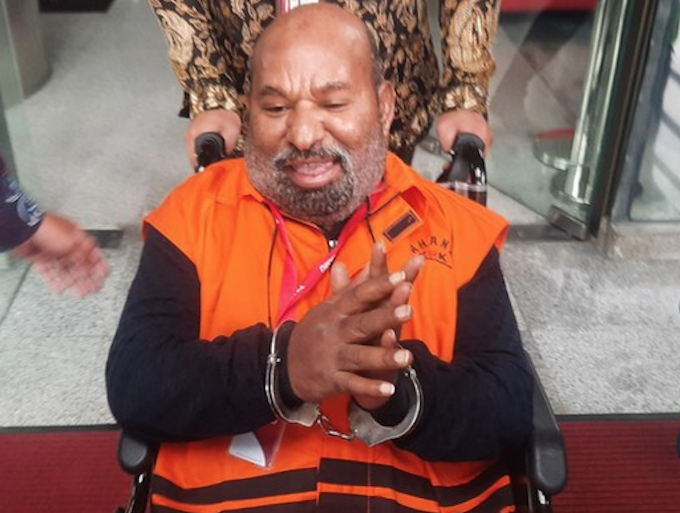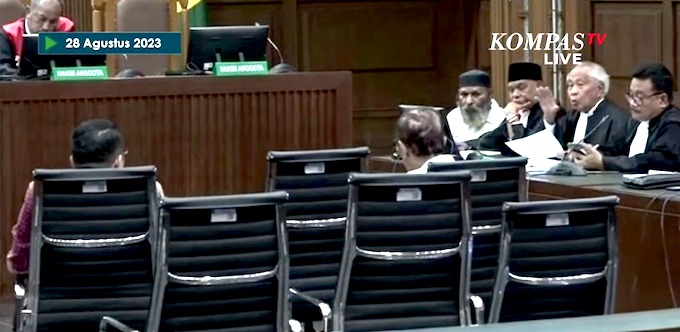
SPECIAL REPORT: By Yamin Kogoya
The Jakarta District Court heard the case of alleged bribery and gratification against suspended Papua governor Lukas Enembe on Monday with evidence from expert witnesses saying that an audit showed records to be “clean and accurate”.
The hearing was convened to hear the testimony of three expert witnesses on the allegations against Governor Enembe.
The panel of judges heard the testimony of two experts Dr Muhammad Rullyandi, SH, MH (a constitutional law expert and lecturer at the Faculty of Law of Jayabaya University) and Dr Eko Sambodo, SE, MM, Mak, CFrA (an expert in state finance and losses), and the third witness was due to be heard today.
- READ MORE: Ailing suspended Papuan governor Enembe now in detention cell after army hospital
- Other Lukas Enembe case reports
The experts concluded that nine reports provided by the country’s state financial audit board during Enembe’s tenure as a governor did not contain any irregularities, or misreporting.
It was all “clean and accurate” within the framework of regulations and procedures, the witnesses said.
Complied with admin law
According to Dr Rullyandi (Indonesians often have single names), the state financial management complied with administrative law, which was supervised by a state institution known as the Badan Pemeriksa Keuangan (BPK), the State Financial Audit Board.
“The BPK is the final step in the state management process, starting with planning, implementation, and before accountability, it is under supervision,” Dr Rullyandi said.
Among the BPK’s responsibilities were the supervision of procurement and service contracting. When the BPK found criminal elements under its supervision, it reported them to the authorised agency required by law, he said.
Dr Rullyandi said that this was regulated in Article 14 of Law No. 15 of 2004 concerning the Examination of State Financial Management and Responsibility.
Article 14 of Law No.15 of 2004 states:
(1) “If criminal elements are detected during the examination, the BPK shall make an immediate report to the appropriate authorities in accordance with the applicable laws and regulations”.
Therefore, before the findings could be prosecuted as articles of bribery or gratification, they must first be tested by the BPK, which then reports them to law enforcement agencies.
Administrative rules
That is the correct way of thinking, said the expert witness.
Law enforcement is not permitted to enter the administrative area while it is still in the administrative process. The law states that when administrative law enforcement occurs, law enforcement should not enter before the BPK makes recommendations,” Dr Rullyandi continued.
The BPK audit report indicates that there were no criminal indications of financial irregularities during the term of Governor Lukas Enembe in regional financial management, including no alleged irregularities in procurement processes for goods and services, which indicates that the principle of legal certainty was met.
According to Dr Rullyandi, initiation of the investigation process into an alleged criminal act of corruption against Governor Lukas Enembe was not based on BPK’s recommendations.
This means, from the beginning of the investigation until it was transferred to the court, investigators ignored Law No. 15 of 2004, especially Article 14. To enforce the law of corruption, relating to criminal norms regulating bribery and gratification, administrative law norms must be considered.
This is accomplished by referring to Law No 1 of 2004 concerning the State Rreasury, which states in section weighing letter c that state financial administration law rules must govern state financial management and accountability.
According to Dr Rullyandi, there is also a provision in Law No. 15 of 2004 pertaining to the Responsibility of State Financial Inspection and Management, which regulates how state finances are handled and held accountable in the fight against criminal corruption.

Abuse of office allegations
“Regarding allegations of abuse of office, Dr Rullyandi said the defendant did not possess the qualifications to abuse his position through bribery and gratification as stated in Articles 11, 12A, and 12B of the Law.
Law No. 31 of 1999 concerning the Eradication of Corruption, as amended by Law No. 20 of 2001.
It was due to the authority or power associated with Enembe’s position, which allowed him to move in order to do or not do something related to the procurement of goods and services. This was given as a result of or caused by something he did or did not do in his position that violated his obligations.
His position as Governor and as user of the budget had been delegated and handed over to the powers of budget users and officials authorised to carry out the procurement committee for goods and services in accordance with Article 18 of Law No. 1 of 2004 concerning the State Treasury.
Particularly, anyone signing or certifying documents related to the letter of evidence that is the basis for the expenditure on APBN / APBD is responsible for its content and consequences.
According to Dr Eko Sambodo’s testimony, if a province [such as Papua] had been given nine times the Unqualified Fair Opinion (abbreviated WTP), administratively, all of them had been managed in accordance with relevant regulations, accountability, and accounting standards.
“When it comes to managing finances, it has been audited, so there are no regulatory violations,” Dr Sambobo said.
Governor Enembe’s senior lawyer, Professor OC Kaligis, asked the witness whether this opinion of the WTP could be used as evidence, that corruption did not exist in the province.
The witness replied that in auditor terms, corruption was known as irregularities. Deviation causes state losses.
It means that everything has been done according to and within regulations, including governance, compilers, and reports. It also means that expenditures have been proven, clarifications have been made, all of which contribute to its final report.
“This is all WTP offers,” said Dr Sambobo. Under the leadership of Governor Enembe, Papua province won the WTP opinion nine times consecutively.
Another expert opinion was due to be heard in court today.
Witness’s testimonies in Court
The court completed hearing witnesses last week (Monday, August 21), who testified to their involvement or knowledge of the alleged bribery, gratification, and corruption scandal.
Out of 184 witnesses, only 17 were brought to court, and only 1 had any connection with Governor Enembe. Sixteen of these witnesses testified as to not have any connection to Enembe.
Only one witness linked to the governor’s name, Prijatono Lakka, a pastor and Enembe’s assistant, who sent Enembe one billion rupiah (NZ$105,000) to cover medical expenses through governor’s personal funds, resulting in an array of allegations, his arrest, and the ongoing process.
To date, no witnesses have emerged to provide testimony or evidence concerning all the alleged wrongdoings and misconduct of Lukas.
Although the governor’s health has improved somewhat, his condition is still critical. The governor’s lawyers continues to ask the judge to detain him in the city for medical treatment and to allow medical specialists outside of the control of Corruption Eradication Commission (acrynomed KPK) to treat him in a free environment.
However, these requests have not been responded to. Currently, the governor is confined to the prison cells of KPK.
He is secheduled to appear in court next week on Monday to bring the final stages of this protracted legal drama to closure.
Lukas Enembe’s term as Papua’s provincial Governor will end during early September — next week.
Yamin Kogoya is a West Papuan academic who has a Master of Applied Anthropology and Participatory Development from the Australian National University and who contributes to Asia Pacific Report. From the Lani tribe in the Papuan Highlands, he is currently living in Brisbane, Queensland, Australia.












































